Published: April 4, 2024
By TalPoint Marketing weekly wrap up
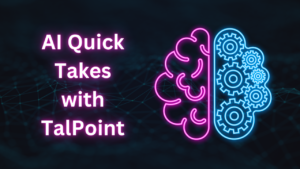
Your weekly source for news and updates on all things AI.
Looking for more regular updates from TalPoint? Follow us on Linkedin, Twitter, or visit us at TalPoint.com.
Read time: under 4 minutes
Huge AI funding leads to hype and ‘grifting’, warns DeepMind’s Demis Hassabis

Navigating AI Hype: Insights from DeepMind Co-Founder
Sir Demis Hassabis, renowned as the co-founder of DeepMind, cautions against the crypto-like hype surrounding the recent surge of investment in artificial intelligence (AI). While acknowledging the incredible scientific strides in the field, Hassabis highlights how the wave of investment has led to exaggerated expectations and regulatory scrutiny. He points out the unfortunate consequence of this hype: the overshadowing of genuine progress and breakthroughs in AI research.
AI Investment Boom: Separating Fact from Fiction
The introduction of OpenAI’s ChatGPT in 2022 sparked a frenzy of investor activity, with venture capital (VC) groups funneling a staggering $42.5 billion into AI start-ups over the past year alone. This influx of capital has propelled the emergence of numerous generative AI ventures, each vying for market dominance and venture funding. Concurrently, public market investors have eagerly embraced technology giants at the forefront of the AI revolution, such as Microsoft, Alphabet, and Nvidia. However, amidst this fervor, regulatory bodies remain vigilant, scrutinizing companies for unsubstantiated AI-related claims. Gary Gensler, chair of the US Securities and Exchange Commission, cautioned against “greenwashing” and “AI washing,” emphasizing the importance of transparency and integrity in AI development and deployment.
The Quest for Artificial General Intelligence (AGI)
Despite the hype and scrutiny surrounding AI, Hassabis maintains an unwavering belief in its transformative potential. He sees AI as a tool capable of revolutionizing scientific discovery, akin to a new Renaissance. Central to this vision is the pursuit of Artificial General Intelligence (AGI), a milestone that remains on the horizon. While some researchers suggest that AGI may still be decades away, Hassabis remains cautiously optimistic, foreseeing the possibility of critical breakthroughs within the next decade. However, he underscores the importance of adopting a scientific approach to AGI development, prioritizing rigor and methodological integrity over expedience. DeepMind’s recent release of the SAFE methodology exemplifies this commitment to reliability, aiming to mitigate factual errors in large language models like OpenAI’s GPT and Google’s Gemini. By refining AI models through cross-checking against reputable sources and fact-checking mechanisms, Hassabis envisions a future where AI technologies are not only powerful but also trustworthy and dependable.
The AI doctor will see you…eventually

In the ever-evolving landscape of healthcare, AI stands poised to revolutionize the industry, promising enhanced diagnostic accuracy, streamlined processes, and personalized patient care. According to analysts, deploying AI in Europe could potentially save hundreds of thousands of lives annually, while in America, it has the potential to trim $200 billion to $360 billion from the $4.5 trillion spent annually on healthcare, which accounts for 17% of GDP. Despite these promising prospects, the integration of AI into healthcare has been sluggish. Challenges persist, including fragmented health data and stringent privacy regulations. Approximately 800,000 Americans suffer from poor medical decision-making each year due to these challenges. Moreover, regulatory bodies struggle to keep pace with AI innovation, leading to delays in approving new AI tools and monitoring their safety and efficacy.
While the obstacles are formidable, the benefits of leveraging AI in healthcare cannot be overstated. By harnessing AI technologies, healthcare providers can significantly improve patient outcomes, enhance efficiency, and potentially reduce costs. Collaboration between governments, regulatory agencies, companies, and healthcare providers is essential to overcome these hurdles and ensure that AI technologies are safe, reliable, and accountable. If successful, the widespread adoption of AI in healthcare could serve as a blueprint for its implementation across other sectors.
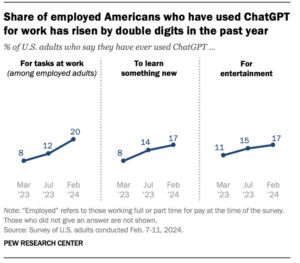
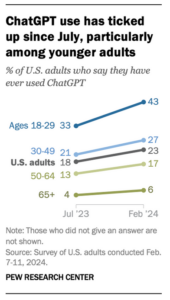
Since its public debut, ChatGPT has continued to captivate the tech world, with recent data in February indicating a rising trend in American usage. The survey revealed that 23% of U.S. adults have used the chatbot, up from 18% in July 2023. Since March 2023, ChatGPT’s usage among Americans has expanded across three primary categories: work, learning, and entertainment. There has been a notable increase in the proportion of employed Americans using ChatGPT for work tasks, while among the general U.S. adult population, there has been a significant uptick in ChatGPT usage for both learning and entertainment purposes. (source)
DBRX: Leading the Charge in Open Source AI

Databricks makes waves with DBRX, its latest open source AI model, outperforming competitors across 12 benchmarks, from reading comprehension to logic. Despite falling short of Claude 3 and GPT-4, DBRX’s transparency sets it apart, offering users complete access to its building blocks.
The Power of Open Source: Unveiling DBRX’s Transparency
DBRX’s transparency revolutionizes AI accessibility, allowing companies to delve into proprietary data without compromising privacy. Unlike closed models, DBRX empowers users to harness AI insights securely, avoiding reliance on major corporations like OpenAI.
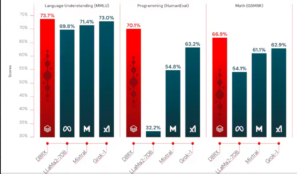
Looking Ahead: The Future of Open Source AI
While Meta’s Llama 2 might be hitting the brakes, anticipation builds for Llama-3’s release, touted to rival GPT-4 in power. As the open source AI landscape evolves, DBRX remains at the forefront, driving innovation and democratizing AI for all.
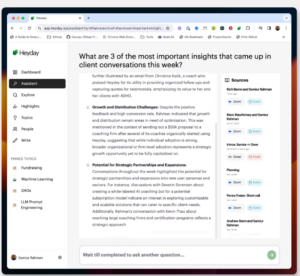
Heyday is an AI copilot that transforms your documents, notes, and conversations into quotes, shareable content, and a queryable database.
———————————————————————————————————————————————————————————————————————————————————————————-
Thanks for reading. Until next weekend!
For questions and feedback, email us at marketing@talpoint.com. We would love to hear from you.